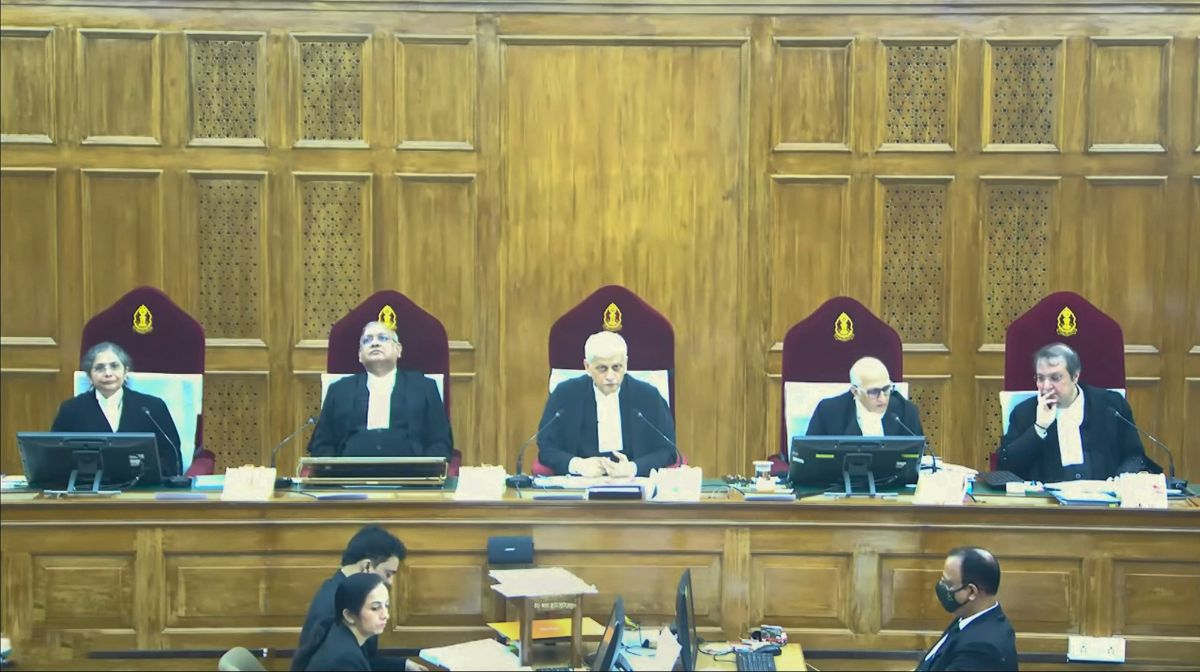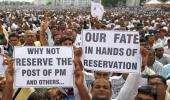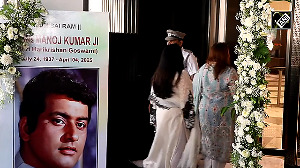In a landmark verdict on Monday, the Supreme Court upheld the 10 per cent reservation introduced in 2019 for economically weaker sections (EWS) in admissions and government jobs that excluded the poor among the SC/ST/OBC categories, saying it is not discriminatory or violative of any essential feature of the Constitution.

The use of basic structure doctrine as a ”sword” to ”stultify” the State's effort to do economic justice cannot be countenanced, the apex court said as its Constitution bench gave a 3:2 majority decision in favour of the 103rd Constitution Amendment.
Treating EWS as a separate category is a reasonable classification and the 50 per cent ceiling on the total reservation under the Mandal judgment is "not inflexible", the judges said while dismissing petitions challenging the validity of the law.
The bench headed by Chief Justice U U Lalit delivered four judgments on 40 petitions against the Amendment that was passed after the Modi government decided to grant quota to the economically weaker sections ahead of the 2019 Lok Sabha election.
Justices Dinesh Maheshwari, Bela M Trivedi and J B Pardiwala upheld the EWS quota.
The CJI, on his last day of presiding court proceedings, was in minority with Justice S Ravindra Bhat when they ruled against it, holding that due to exclusion of poor of SCs, STs, and OBSs from its ambit, the Amendment ''practices constitutionally prohibited forms of discrimination”.
The apex court held that reservation is an instrument of affirmative action by the State so as to ensure an all-inclusive march towards the goals of an egalitarian society while counteracting inequalities.
”In the ultimate analysis, it is beyond doubt that using the doctrine of basic structure as a sword against the amendment in question and thereby to stultify State's effort to do economic justice as ordained by the Preamble and DPSP and, inter alia, enshrined in Articles 38, 39 and 46, cannot be countenanced,” Justice Maheswari, in his 155-page separate verdict, said.
”This is essentially for the reason that the provisions contained in Articles 15 and 16 of the Constitution of India, providing for reservation by way of affirmative action, being of exception to the general rule of equality, cannot be treated as a basic feature,” he said.
The doctrine of basic structure cannot be invoked for laying a challenge to the 103rd Amendment, the judgment said, adding that other contentions and submissions need not be dilated.
Upholding the EWS quota, Justice Maheswari said the reservation is an instrument not only for the inclusion of socially and educationally backward classes to the mainstream of society but, also for the inclusion of any class or section so disadvantaged as to be answering the description of a weaker section.
”In this background, reservation structured singularly on economic criteria does not violate any essential feature of the Constitution of India and does not cause any damage to the basic structure of the Constitution of India."
Justice Trivedi, in her 24-page concurring views with Justice Maheswari, said the concept of equality allows differential treatment but it prevents distinctions that are not properly justified.
”Equality is violated if it rests on unreasonable classification. A reasonable classification is permissible, which includes all who are similarly situated, and none who are not. Discrimination is the essence of classification. Those who are similarly circumscribed are entitled to equal treatment.
”Classification has to be founded on substantial differences which distinguish persons grouped together from those left out of the groups, and such differential attributes must bear a just and rational relation to the object sought to be achieved,” she said.
Justice Pardiwala, who also wrote a concurring 117-page verdict upholding the EWS quota, said that the quota in jobs and admissions on the sole economic criteria did not violate the basic structure of the Constitution.
He along with Justice Trivedi said that there was a need to have a time span for such reservations as they cannot be continued for all the time.
”The policy of reservation must have a time span, has still not been achieved even till this day, i.e. till the completion of seventy-five years of our Independence.
"It cannot be gainsaid that the age-old caste system in India was responsible for the origination of the reservation system in the country,” he said.
The quota was introduced to correct the historical injustice faced by the persons belonging to the SCs and STs and other backward classes, and to provide them a level playing field to compete with the persons belonging to the forward classes, Justice Paardiwala said.
”However, at the end of seventy-five years of our independence, we need to revisit the system of reservation in the larger interest of the society as a whole, as a step forward towards transformative constitutionalism,” he said.
The majority view of three judges held that exclusion of the classes like SCs, STs and OBCs from getting the benefit of reservation as economically weaker sections, being in the nature of balancing the requirements of non-discrimination and compensatory discrimination, does not violate Equality Code and does not in any manner cause damage to the basic structure of the Constitution.
”Reservation for economically weaker sections of citizens up to ten per cent in addition to the existing reservations does not result in violation of any essential feature of the Constitution of India;
"And does not cause any damage to the basic structure of the Constitution of India on account of breach of the ceiling limit of fifty per cent because, that ceiling limit itself is not inflexible and in any case, applies only to the reservations envisaged by Articles 15(4), 15(5) and 16(4) of the Constitution,” it held.
The judgment concluded that the amendment cannot be said to breach the basic structure.
Justice Maheswari, in his verdict, referred to the questions which were deliberated upon by the bench saying that the first issue was whether the 103rd Constitution Amendment was violative of the basic structure for providing reservation solely on the basis of economic criteria.
”Whether the amendment is violative of the basic structure for excluding the poor among the SC/ST/OBC categories from EWS Quota,” he said, adding that the third question was if the amendment violated the basic structure for breaching the 50 percent ceiling limit of quota.
The majority opinion answered the three questions in the negative.
Justice Bhat, in his dissenting minority verdict, said that the quota on the ground of economic criteria was ”per se not violative”, but it has to go due to the exclusion of poor SCs, STs, and OBSs from its ambit.
”I regret my inability to concur with the views expressed by the majority opinion on the validity of the 103rd Amendment on Question No. 3, since I feel -- for reasons set out elaborately in the following opinion - that this court has for the first time, in the seven decades of the republic, sanctioned an avowedly exclusionary and discriminatory principle. Our Constitution does not speak the language of exclusion.
”In my considered opinion, the amendment, by the language of exclusion, undermines the fabric of social justice, and thereby, the basic structure,” said Justice Bhat.
"Our Constitution does not permit exclusion and this amendment undermines the fabric of social justice and thereby the basic structure," the minority verdict said.
"This amendment is deluding us to believe that those getting social and backward class benefits are somehow better placed. This court has held that 16(1) and (4) are facets of the same equality principle... The exclusion is based on social origin which destroys the equality code,” the minority verdict said.
The apex court had on September 27 reserved the verdict after hearing a battery of senior lawyers, including the then Attorney General K K Venugopal and Solicitor General Tushar Mehta, in a marathon hearing that had lasted for six-and-half-days.
The top court heard as many as 40 petitions and most of the pleas, including the lead one filed by 'Janhit Abhiyan' in 2019, challenged the validity of the Constitution Amendment (103rd) Act 2019.
Lok Sabha and Rajya Sabha cleared the bill on January 8 and 9 in 2019 respectively and it was then signed by then-President Ram Nath Kovind.
The EWS quota is over and above the existing 50 per cent reservation to SCs, STs, and Other Backward Classes (OBCs).











 © 2025
© 2025